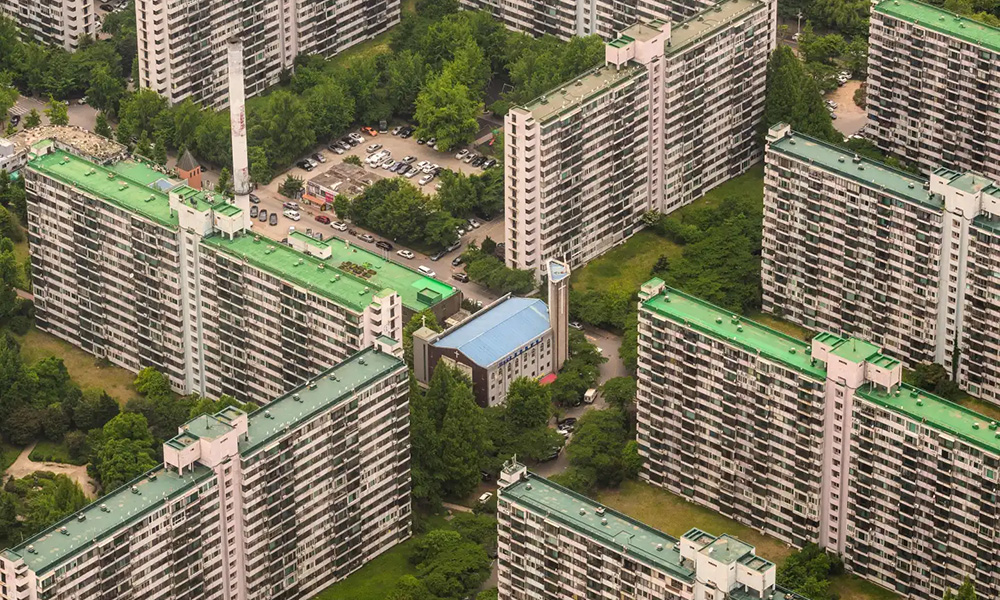
隨著韓國央行長達(dá)一年的緊縮周期影響高檔房地產(chǎn)市場,位于韓國首都首爾江南區(qū)的三個高檔社區(qū)的房價開始下跌。
韓國房地產(chǎn)委員會的數(shù)據(jù)顯示,江南區(qū)全境的公寓價格連續(xù)四周下跌,這是自韓國銀行(Bank of Korea)于去年8月上調(diào)關(guān)鍵利率以來,該地區(qū)的房價首次出現(xiàn)環(huán)比下跌。
江南區(qū)房價受到的沖擊,意味著韓國的緊縮政策開始對5,100萬人口中的上流階層產(chǎn)生影響。
雖然韓國央行的行長李昌鏞告訴彭博社,房地產(chǎn)市場回調(diào)不可避免,并且是利好消息,但對房地產(chǎn)市場和家庭負(fù)債的擔(dān)憂,是促使韓國銀行恢復(fù)小幅升息的因素之一。
首爾市被納入萊坊全球城市豪宅指數(shù)(Knight Frank Prime Global Cities Index)的住宅,絕大多數(shù)都是位于江南區(qū)的公寓。該指數(shù)去年創(chuàng)下自2008年以來的最快上漲速度,現(xiàn)在增速有所放緩。
全球5%最令人渴望的、最昂貴的豪宅市場降溫,恰逢美聯(lián)儲開始加息,并且人們對全球經(jīng)濟(jì)衰退的擔(dān)憂持續(xù)加劇。
萊坊的國際住宅研究負(fù)責(zé)人凱特·埃弗里特-艾倫說:“我預(yù)計在第三季度,隨著不利的經(jīng)濟(jì)因素持續(xù)增多,該指數(shù)的增長率會進(jìn)一步下降。”
“但我預(yù)計我們的豪宅指數(shù)的表現(xiàn),將優(yōu)于主流房地產(chǎn)市場指數(shù),因為后者更依賴金融,因此更容易受到加息影響。”
據(jù)萊坊統(tǒng)計,首爾以江南區(qū)為核心的豪宅市場,是過去一年亞洲最火爆的市場,房價上漲20.9%,超過了日本東京和中國臺北。
萊坊跟蹤的公寓包括來美安道谷城,每套價值38億韓元(280萬美元)和Acro River Park(定價高達(dá)220億韓元)。據(jù)韓國網(wǎng)站Naver報道,三星大廈廣場3期的交易價格高達(dá)75億韓元。

韓國歌手Psy的《江南Style》(Gangnam Style)音樂視頻,讓江南區(qū)全球聞名,它在韓國人心目中代表了財富、地位和時尚。當(dāng)?shù)赜芯秘?fù)盛名的高中和各路名流,使它成為韓國精英們心目中的圣地。
江南區(qū)的房價下跌幅度,往往超過其他許多地區(qū)。在2012年至2014年房價下跌期間,江南區(qū)的房價跌幅超過了國內(nèi)其他大多數(shù)地區(qū)。2008年至2009年全球金融危機(jī)期間,韓國的房價也出現(xiàn)了類似的波動。
美聯(lián)儲的主席杰羅姆·鮑威爾等中央銀行家在今年8月曾經(jīng)于杰克遜霍爾召開的會議上警告,借款成本會進(jìn)一步升高,并且在一定時間內(nèi)將始終居高不下,因此房地產(chǎn)市場將面臨更大的壓力。
江南區(qū)曾經(jīng)是一片高低不平的農(nóng)田,目前有200萬名居民,包括韓國總統(tǒng)尹錫悅等政府高官、韓流明星以及許多商界和科技界領(lǐng)袖等。
當(dāng)?shù)夭⒎撬芯用穸际欠歉患促F。今年8月,首爾遭遇了80年不遇的暴雨,江南區(qū)至少有四位居民在地下室中溺亡,這暴露出奧斯卡獎(Oscar)獲獎影片《寄生蟲》中所描繪的韓國社會嚴(yán)重的貧富差距。
這場暴雨還暴露出一些高檔公寓不為人知的一面,被淹沒的蘭博基尼和保時捷,以及在地下停放的無數(shù)豪車。
與許多西方國家相比,韓國人通常更喜歡公寓而不是獨棟住宅。在高人口密度的國家,造型千篇一律的住宅公寓占地面積更小,被認(rèn)為能夠更好地防止入室盜竊,管理成本更低,而且更容易交易,因為公寓的建筑規(guī)格類似。
然而,豪宅市場的初步回調(diào)并不局限于江南區(qū)。韓國國民銀行在上周發(fā)布的數(shù)據(jù)顯示,該銀行在全國挑選的50套豪宅的房價已經(jīng)連續(xù)兩個月下跌。
豪宅市場降溫顯然表明,央行的緊縮政策正在影響到房價。
由于對金融失衡的日益擔(dān)憂,韓國銀行比大多數(shù)發(fā)達(dá)國家更早開始了加息周期。房價暴漲放大了韓國嚴(yán)重的貧富差距,引發(fā)了公眾憤怒,并幫助尹錫悅在今年早些時候的大選中擊敗文在寅當(dāng)選總統(tǒng)。
現(xiàn)在,隨著房價開始下跌,形勢開始逆轉(zhuǎn)。但潛在購房人并沒有急于尋找經(jīng)紀(jì)人購買房產(chǎn)。
韓國銀行的加息和進(jìn)一步收緊政策的預(yù)期以及低成交量,讓購房人相信房價會持續(xù)下跌。
野村控股的經(jīng)濟(jì)學(xué)家樸正宇說:“如果家庭開始去杠桿,我們預(yù)計未來幾年的房價就會始終面臨壓力。”(財富中文網(wǎng))
譯者:劉進(jìn)龍
審校:汪皓
隨著韓國央行長達(dá)一年的緊縮周期影響高檔房地產(chǎn)市場,位于韓國首都首爾江南區(qū)的三個高檔社區(qū)的房價開始下跌。
韓國房地產(chǎn)委員會的數(shù)據(jù)顯示,江南區(qū)全境的公寓價格連續(xù)四周下跌,這是自韓國銀行(Bank of Korea)于去年8月上調(diào)關(guān)鍵利率以來,該地區(qū)的房價首次出現(xiàn)環(huán)比下跌。
江南區(qū)房價受到的沖擊,意味著韓國的緊縮政策開始對5,100萬人口中的上流階層產(chǎn)生影響。
雖然韓國央行的行長李昌鏞告訴彭博社,房地產(chǎn)市場回調(diào)不可避免,并且是利好消息,但對房地產(chǎn)市場和家庭負(fù)債的擔(dān)憂,是促使韓國銀行恢復(fù)小幅升息的因素之一。
首爾市被納入萊坊全球城市豪宅指數(shù)(Knight Frank Prime Global Cities Index)的住宅,絕大多數(shù)都是位于江南區(qū)的公寓。該指數(shù)去年創(chuàng)下自2008年以來的最快上漲速度,現(xiàn)在增速有所放緩。
全球5%最令人渴望的、最昂貴的豪宅市場降溫,恰逢美聯(lián)儲開始加息,并且人們對全球經(jīng)濟(jì)衰退的擔(dān)憂持續(xù)加劇。
萊坊的國際住宅研究負(fù)責(zé)人凱特·埃弗里特-艾倫說:“我預(yù)計在第三季度,隨著不利的經(jīng)濟(jì)因素持續(xù)增多,該指數(shù)的增長率會進(jìn)一步下降。”
“但我預(yù)計我們的豪宅指數(shù)的表現(xiàn),將優(yōu)于主流房地產(chǎn)市場指數(shù),因為后者更依賴金融,因此更容易受到加息影響。”
據(jù)萊坊統(tǒng)計,首爾以江南區(qū)為核心的豪宅市場,是過去一年亞洲最火爆的市場,房價上漲20.9%,超過了日本東京和中國臺北。
萊坊跟蹤的公寓包括來美安道谷城,每套價值38億韓元(280萬美元)和Acro River Park(定價高達(dá)220億韓元)。據(jù)韓國網(wǎng)站Naver報道,三星大廈廣場3期的交易價格高達(dá)75億韓元。
韓國歌手Psy的《江南Style》(Gangnam Style)音樂視頻,讓江南區(qū)全球聞名,它在韓國人心目中代表了財富、地位和時尚。當(dāng)?shù)赜芯秘?fù)盛名的高中和各路名流,使它成為韓國精英們心目中的圣地。
江南區(qū)的房價下跌幅度,往往超過其他許多地區(qū)。在2012年至2014年房價下跌期間,江南區(qū)的房價跌幅超過了國內(nèi)其他大多數(shù)地區(qū)。2008年至2009年全球金融危機(jī)期間,韓國的房價也出現(xiàn)了類似的波動。
美聯(lián)儲的主席杰羅姆·鮑威爾等中央銀行家在今年8月曾經(jīng)于杰克遜霍爾召開的會議上警告,借款成本會進(jìn)一步升高,并且在一定時間內(nèi)將始終居高不下,因此房地產(chǎn)市場將面臨更大的壓力。
江南區(qū)曾經(jīng)是一片高低不平的農(nóng)田,目前有200萬名居民,包括韓國總統(tǒng)尹錫悅等政府高官、韓流明星以及許多商界和科技界領(lǐng)袖等。
當(dāng)?shù)夭⒎撬芯用穸际欠歉患促F。今年8月,首爾遭遇了80年不遇的暴雨,江南區(qū)至少有四位居民在地下室中溺亡,這暴露出奧斯卡獎(Oscar)獲獎影片《寄生蟲》中所描繪的韓國社會嚴(yán)重的貧富差距。
這場暴雨還暴露出一些高檔公寓不為人知的一面,被淹沒的蘭博基尼和保時捷,以及在地下停放的無數(shù)豪車。
與許多西方國家相比,韓國人通常更喜歡公寓而不是獨棟住宅。在高人口密度的國家,造型千篇一律的住宅公寓占地面積更小,被認(rèn)為能夠更好地防止入室盜竊,管理成本更低,而且更容易交易,因為公寓的建筑規(guī)格類似。
然而,豪宅市場的初步回調(diào)并不局限于江南區(qū)。韓國國民銀行在上周發(fā)布的數(shù)據(jù)顯示,該銀行在全國挑選的50套豪宅的房價已經(jīng)連續(xù)兩個月下跌。
豪宅市場降溫顯然表明,央行的緊縮政策正在影響到房價。
由于對金融失衡的日益擔(dān)憂,韓國銀行比大多數(shù)發(fā)達(dá)國家更早開始了加息周期。房價暴漲放大了韓國嚴(yán)重的貧富差距,引發(fā)了公眾憤怒,并幫助尹錫悅在今年早些時候的大選中擊敗文在寅當(dāng)選總統(tǒng)。
現(xiàn)在,隨著房價開始下跌,形勢開始逆轉(zhuǎn)。但潛在購房人并沒有急于尋找經(jīng)紀(jì)人購買房產(chǎn)。
韓國銀行的加息和進(jìn)一步收緊政策的預(yù)期以及低成交量,讓購房人相信房價會持續(xù)下跌。
野村控股的經(jīng)濟(jì)學(xué)家樸正宇說:“如果家庭開始去杠桿,我們預(yù)計未來幾年的房價就會始終面臨壓力。”
譯者:劉進(jìn)龍
審校:汪皓
Property in Gangnam — a trio of exclusive districts in South Korea’s capital, Seoul — is beginning to buckle as the central bank’s yearlong tightening cycle weighs on the luxury real estate market.
Apartment prices in all Gangnam districts have declined for four consecutive weeks, data from the Korea Real Estate Board show, portending the first monthly decline since the Bank of Korea began raising its key rate last August.
The hit to Gangnam signals the impact of policy tightening is now reaching into the upper stratum of Korea’s 51 million people.
While Governor Rhee Chang-yong told Bloomberg that a housing correction was unavoidable and has a desirable element, concern over the property market and household debt are among factors that have prompted the BOK to return to smaller rate increases.
Gangnam apartments make up an overwhelming majority of Seoul homes factored into the Knight Frank Prime Global Cities Index, which has slowed after rising last year at the fastest pace since 2008.
The cooling momentum among the world’s most desirable and expensive 5% of homes coincides with the start of the Federal Reserve’s rate increases and rising concern about a global recession.
“My expectation is that we will see the index’s rate of growth slow further in the third quarter as economic headwinds mount,” said Kate Everett-Allen, head of international residential research at Knight Frank.
“But we expect our prime index to outperform our mainstream housing market indices where there is a greater reliance on finance and therefore more exposure to the rate rises.”
With Gangnam at its heart, Seoul’s prime real estate was Asia’s hottest in the past year, jumping 20.9% and outpacing both Tokyo and Taipei, according to Knight Frank.
Apartments tracked by Knight Frank include Raemian Dogok County, which costs up to 3.8 billion won ($2.8 million) per unit, and Acro River Park, priced at as much as 22 billion won. Samsung Tower Palace 3rd traded for up to 7.5 billion won, according to Korean portal Naver.
Made internationally famous by Psy’s “Gangnam Style” music video, the districts symbolize wealth, status and chic among Koreans. Their cluster of prestigious high schools and network of influential residents make the neighborhood a Mecca for South Korea’s elite.
Still, when Gangnam falls, it tends to drop harder than many other areas. During the 2012-2014 downturn, Gangnam declined further than most of the rest of the country. Similar volatility was recorded during the 2008-09 global financial crisis.
Further pressure is likely to come, too, with central bankers including Fed Chair Jerome Powell warning at August’s Jackson Hole meeting that borrowing costs are headed even higher and will remain elevated for some time.
Gangnam, once rugged farmland, is now home to 2 million people, including high-level officials such as President Yoon Suk Yeol, K-pop stars and an array of business and tech leaders.
Not everyone in the districts is rich and famous. When the heaviest rainstorm in 80 years hit Seoul in August, at least four Gangnam residents drowned in the basement homes that came to symbolize Korea’s deep wealth inequality in the Oscar-winning film “Parasite.”
The torrential rains also exposed unexpected gaps in some luxury apartments, submerging Lamborghinis, Porsches and hundreds of other luxury cars parked underneath them.
Koreans as a rule prefer apartments to standalone homes, in contrast to many Western countries. The cookie-cutter buildings take up less space in the densely-populated country and are viewed as safer against burglary, cheaper to manage and easier to trade because they are built to similar specifications.
The incipient correction in luxury homes isn’t limited to Gangnam, either. The 50 premium homes picked nationwide by Kookmin Bank have fallen for two months in a row, according to data released last week.
The cooling is a clear sign that the central bank’s policy tightening is flowing through to property.
The BOK began its rate-hike cycle earlier than most developed economies as it grew concerned about financial imbalances. Korea’s widening wealth divide, amplified by soaring home prices, fueled public?anger and drove an electoral wave that helped Yoon oust Moon Jae-in in an election earlier this year.
Now, as home prices begin to fall, the tables are turning. But potential buyers aren’t rushing to brokers to try to secure a property.
The BOK’s rate rises and expectations of further tightening, together with the low volume of deals, are fueling expectations the downturn will be protracted.
“With households starting a deleveraging cycle, we expect housing prices to remain under pressure in coming years,” said Park Jeong Woo, an economist at Nomura Holdings Inc.






